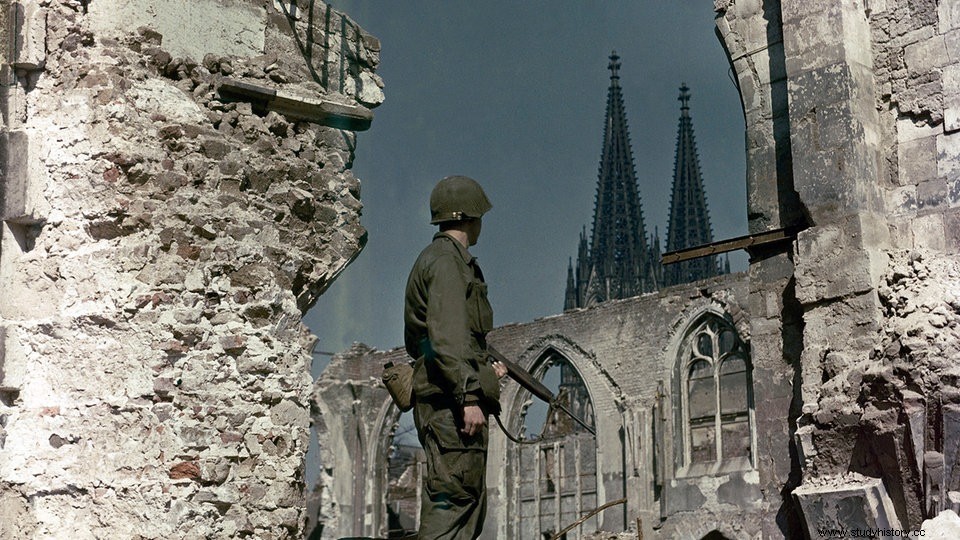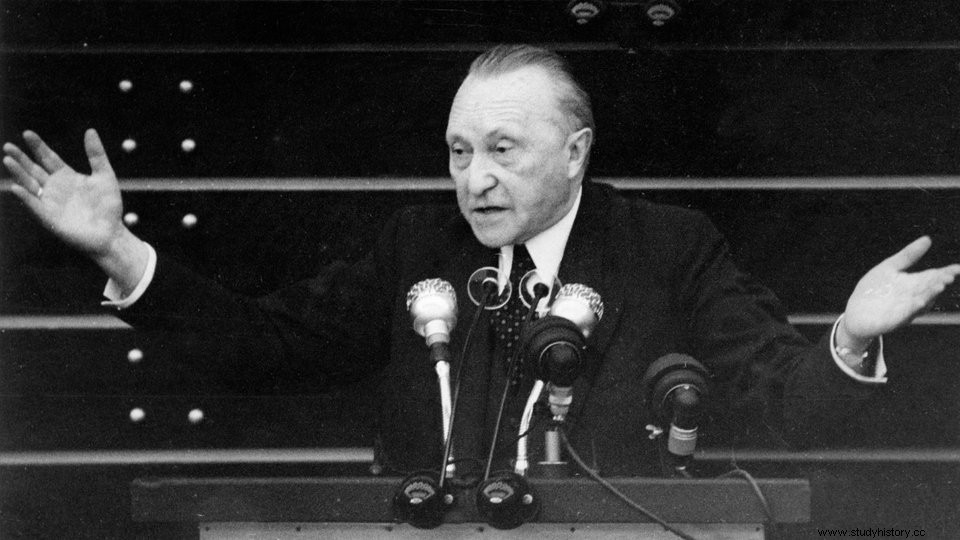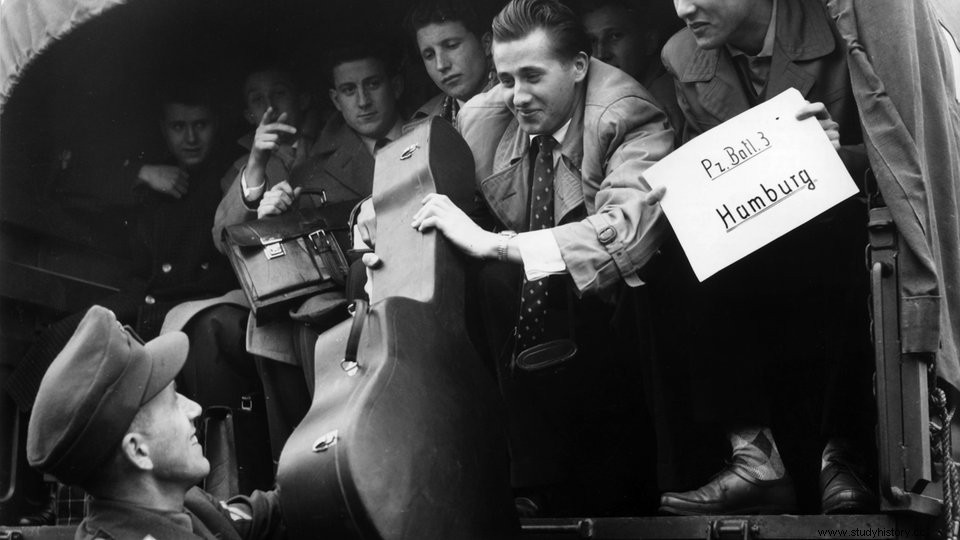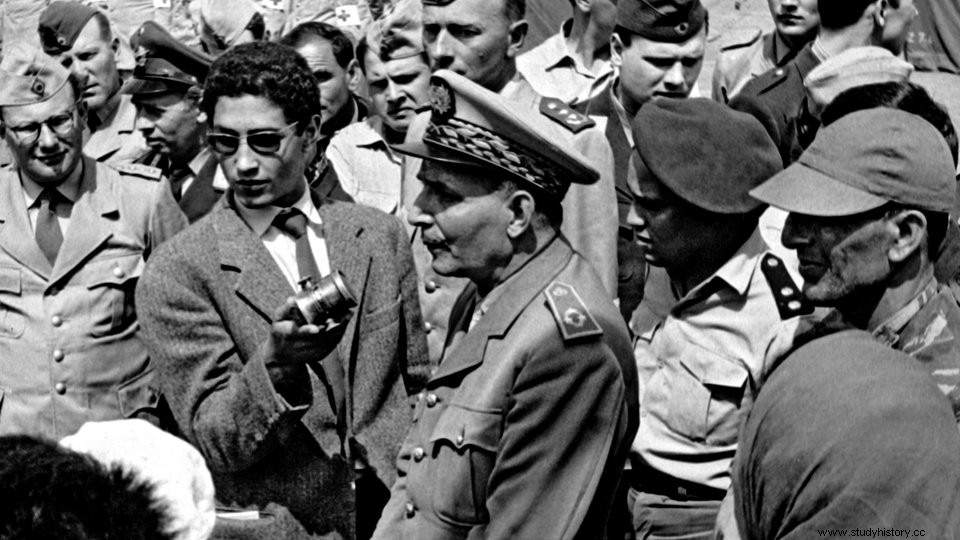The Bundeswehr was designed according to democratic and constitutional principles. How did it change from a defense army to an international task force?
1945:Occupied and demilitarized
The end of the Second World War on May 8, 1945 also meant the end of Germany's army. During the war, the Allies had decided to demilitarize the country in the event of victory.
Germany, which had started two world wars, was to lose its political, economic and military influence completely. The Wehrmacht, Waffen-SS and all other German military units were disbanded, and any stocks of weapons still in existence were destroyed or taken away from Germany.
In addition, the German armaments industry had to shut down operations at the behest of the victorious powers, and company facilities were dismantled and destroyed. As part of the Allies' denazification policy, many Wehrmacht soldiers and members of the SS were checked to determine what role they had played during the Nazi era and whether they had been involved in serious crimes.
With the exception of the highest-ranking military officers, however, most of the soldiers who went to war for Hitler escaped unmolested and with their reputations intact.
Shortly after the end of the war, there were discussions between the victorious powers about how to deal with the defeated Germans. The Soviet Union advocated extremely tough action. The USA, on the other hand, soon promoted rapid economic development. They were keen to establish Germany as an anti-communist bastion.

Zero hour in Cologne
From 1949:Discussion about rearmament
After the Federal Republic was founded on May 23, 1949, the question of having its own military was one of the biggest discussions in the German Bundestag. Chancellor Konrad Adenauer (CDU) wanted to anchor Germany firmly in the western alliance system. In addition to political coordination in the Council of Europe and economic cooperation in the Montanunion, Adenauer also aimed for Germany's military participation in the North Atlantic Treaty Organization (NATO).
Opposition politicians, above all from the SPD and KPD, condemned the plans and referred to Germany's recent past and the terrible consequences of the two world wars. Adenauer's plans were also controversial within the government. The Federal Minister of the Interior at the time, Gustav Heinemann, resigned from his post in 1950 because he was against rearmament.

Federal Chancellor Konrad Adenauer wanted to be linked to NATO
If Germany doesn't have an army, it can't go to war either, was the argument of the extra-parliamentary "Ohne mich!" movement, in which trade unions, intellectuals and peace activists took part. Under the impact of the Korean War, however, the attitude of many Germans to rearmament changed in the early 1950s.
The Cold War between the US and the Soviet Union increased fears of fighting on German soil; an army for defensive purposes appeared to many as a necessary evil. In 1952, the Germany Treaty was concluded with the western victorious powers, which guaranteed the country extensive sovereignty from May 1955. At the same time, Germany joined NATO. The way was clear for an army of their own.
 Start video, cancel with escape
Start video, cancel with escape Discussion about German rearmament in 1949
planet knowledge. 01/10/2020. 03:12 min. Available until 01/10/2025. SWR.
1955:Foundation of the Bundeswehr
On November 12, 1955, the first 101 volunteer soldiers received their certificates of appointment. A little over ten years after the end of the Second World War, the Federal Republic raised an army.
However, the armed forces were not given an official name until April 1956. The suggestion of "Wehrmacht" was rejected because the aim was to prevent a conceptual association with the Nazi era. Instead, the Bundestag decided on "Bundeswehr" based on the "Reichswehr" of the Weimar Republic.
The Bundeswehr was defined as a defensive army in the Basic Law. At the same time, the preparation or waging of aggressive war was declared punishable and unconstitutional.
The supreme command of the army was placed in civilian hands. In times of peace it is subordinate to the Minister of Defense and in times of war to the Federal Chancellor. In addition, the parliament exercises a control function over the budget approval and the defense committee.
Many German men saw the Bundeswehr as an attractive employer in the economically difficult post-war period. Already in the first eight months of the founding year 1955, 150,000 volunteers registered. In order to prevent Nazi criminals from getting into managerial positions, higher ranks had to face a committee.
Nevertheless, almost all officers had served in the Wehrmacht during World War II. Adenauer rejected the criticism of this situation with the remark that NATO does not accept "18-year-old generals". The rearmament of Germany was viewed critically by the Soviet Union and led to the Berlin Crisis in 1958.

Soldier supplies for the Bundeswehr
1956:Introduction of conscription
In 1956, general conscription was passed, and on April 1, 1957, the first 10,000 conscripts moved into the barracks. On the one hand, the introduction of conscription had purely practical reasons:In order to achieve the desired troop strength of half a million active soldiers (plus 700,000 reservists), it was not enough to only enlist soldiers on a voluntary basis.
In addition, the army should be more closely linked to German society. The ideal image of the Bundeswehr soldier was described as a "citizen in uniform". The Bundeswehr should not form a "state within a state". Fundamental rights and the rule of law should be observed.
In the Bundestag, for example, the Parliamentary Commissioner for the Armed Forces was installed as a person of trust to whom soldiers can address complaints and petitions if they see their fundamental rights being violated.
The principle of "internal leadership" with democratic principles did not always stand up to the practical test. Some of the officers trained in the Wehrmacht resorted to harassing methods and showed major shortcomings in leadership. In June 1957, for example, a non-commissioned officer ordered a river to be crossed, although this had previously been deemed too dangerous. 15 soldiers were swept away and drowned in the floods.
Initially, military service lasted twelve months, and all German men over the age of 18 were drafted. At that time, very few took advantage of the option of refusing military service. By 2010, more than eight million Germans were doing basic military service.
1960:First assignment abroad
In the early years of the Bundeswehr, the emergency was often rehearsed, but it never happened. The first foreign deployment of Bundeswehr soldiers did not take place until 1960, although this did not consist of combat operations:a severe earthquake on February 29, 1960 in Agadir, Morocco, killed 15,000 people and left tens of thousands homeless.
Two days later, three Luftwaffe squadrons and the Defense Ministry's flight readiness team set off, and a total of 31 transport aircraft were made available. They had a complete hospital, medicine, tents and medical soldiers from the army, navy and air force on board.
The soldiers helped with the evacuation, cared for the injured and prepared drinking water. Transport planes flew from Germany to Morocco several times a day to deliver relief supplies and materials. The last soldiers returned to Germany in mid-April 1960.
The mission was rated a success and helped to increase the national and international reputation of the Bundeswehr. The trust of the world community in the German army and its capabilities grew steadily over the years. By 2010, auxiliary troops of the Bundeswehr had set out on more than 100 missions - in the event of natural disasters, famine or major fires.

The Federal Government is donating a Bundeswehr field hospital to Morocco
